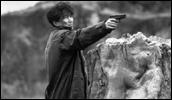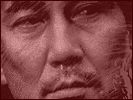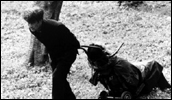Charisma
- Year
- 1999
- Original title
- Karisuma
- Japanese title
- カリスマ
- Director
- Cast
- Running time
- 103 minutes
- Published
- 20 March 2001



by Tom Mes
The screenplay for Charisma was originally written in the early 90s. It earned Kiyoshi Kurosawa a scholarship from the Sundance Institute, which allowed the man who at that point had already been directing for almost a decade, to study filmmaking in the U.S. Being a devoted fan of American genre cinema, he accepted the opportunity with relish. Almost another decade later, Nikkatsu gave Kurosawa the chance to turn his award-winning screenplay into a film.
After bungling a hostage situation and causing the deaths of both hostage and perpetrator, detective Yabuike (Yakusho) is sent on leave by his superiors. In a plot construction that seems to reference Hiroshi Teshigahara's Woman in the Dunes (Suna no Onna, 1964), Yakusho's character distractedly misses the bus home and finds himself wandering into the dying, decrepit forest not far from the scene of the crime.
Here, the cop encounters a number of people - a female botanist, a group of radical forest rangers and a young hermit - whose lives all revolve around one thing: a single specimen of a rare breed of tree growing in a clearing in the middle of the woods. The botanist believes this tree to be the source of the poison that is slowly killing the surrounding forest and wishes to destroy it. The rangers share her opinion, but their main drive is money and preserving the status quo; they have been hired by the administration to retrieve the tree for further research. The young man meanwhile tries everything in his power to nurture and protect it, even firing guns at those who approach the tree.
Masquerading as a detective film, Charisma emerges to be a highly metaphoric, thematically rich piece of cinema. Raising questions about the role of the individual in modern-day Japanese society (as represented by the solitary tree), and with the various supporting characters representing the ongoing ideological struggles between reactionary and revolutionary forces over this matter of individuality (individualism might or might not cause the deterioration of society), the final message as embodied by Yakusho's cop seems to be that one needs to accept the world as it is and learn to carve ones own niche within it.
Despite its screenplay dating back more than a decade, this makes Charisma a logical extension of the approaches and themes of the director's recent work. In fact, in many ways Charisma plays and feels like a sequel to his 1997 festival hit and international breakthrough film Cure. This is due in no small amount to the casting of Koji Yakusho in the lead, but also in Kurosawa's use of sound, the dilapidated sets and locations and overall atmosphere of oppressive gloom, Charisma certainly mirrors its predecessor.
Above all the similarities in the characters Yakusho plays in both films give one the impression that we might be looking at Cure 2. In Charisma, Yakusho's cop is like an older, more disillusioned version of his Cure character - a man who has nothing left to lose and who wanders through the world with a sense of detachment that makes him impervious to the troubles that human beings have to cope with in daily life.
Perhaps knowing these parallels will draw people to the film who might otherwise find it heavy going. In Japan, the enigmatic nature of Charisma's story and Kurosawa's heavy use of symbolism has provoked many different reactions. These range from criticism against the director for diving too deep into metaphoric filmmaking and making a pretentious film whose sole purpose is to glorify the intellect of its creator, to the highly novel (though not entirely unfounded) interpretation that it is in fact a cynical parody of Hayao Miyazaki's Princess Mononoke (Mononoke Hime, 1997).
One thing is true: Charisma definitely stirs a reaction in the viewer. For my money, it's a fascinating, enthralling and rewarding film, one that keeps its audience thinking, guessing and wondering at every turn.